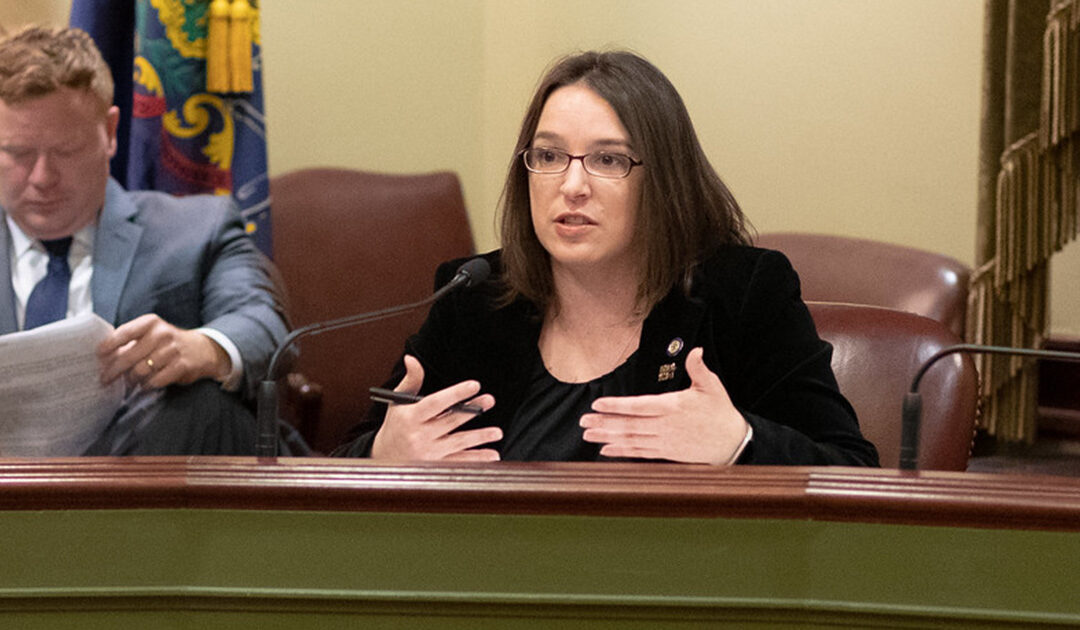Harrisburg, Pa. −January 29, 2021 − Today, Senator Lindsey M. Williams (D-Allegheny), Senator Katie Muth (D-Chester, Montgomery, Berks), and members of the Democratic caucus released a package of Senate Operating Rules Reform co-sponsorship memos. These memos outline much-needed changes to the Senate Rules that are designed to advance policy, ensure government transparency, encourage public participation in the legislative process, and hold Senators accountable to the public.
Many of the memos included in today’s Rules Package were originally part of Senate Resolution 4, a reform-minded, comprehensive set of Senate Operating Rules for the 2021-22 Session that was introduced by Senator Muth on Opening Day of the new Session. Unfortunately, instead of receiving a vote as the other proposed Rules Resolutions did that day, Senate Republicans referred SR4 to the Rules Committee. Because current Senate rules permit legislation disfavored by the Majority party to be referred to committee where it can sit indefinitely without consideration, Senators Muth and Williams anticipate that SR 4 will never receive a vote. As a result, they have chosen to introduce these reforms as stand-alone legislation to emphasize the desperate need to protect and advance the democratic process and improve transparency.
“We hear a lot of talk about transparency, accountability, and bipartisan work from our Senate colleagues,” said Senator Williams. “But talking is easy. We had an opportunity at the beginning of this Session to adopt a set of Operating Rules that would actually put these values into practice, but the majority chose to stick with the status quo. Pennsylvanians deserve better — they deserve to have their voices heard and to have their elected officials be accountable to them.”
“I am incredibly disappointed and frustrated that the Majority Party decided to disregard all of our proposed changes to the Senate Operating Rules that we presented back in December and again at the beginning of this month,” said Senator Muth. “The current Senate Operating Rules are structured to benefit the Majority Party. The millions of Pennsylvanians who are represented by senators in the Minority Party are silenced and sidelined by these unfair, inequitable, and exclusionary rules. Passing this legislative package of Senate Operating Rules Reform would ensure a representative democracy and allow for the people of our Commonwealth to be prioritized, instead of special interests and partisan agendas.”
Co-sponsorship memos introduced today include:
- All Legislation Gets a Vote (sponsored by Senators L. Williams, Muth, and Jim Brewster (D-Allegheny, Westmoreland)) would require that every piece of legislation introduced, including both bills and resolutions, receive a committee vote. This will prevent individual Senators from having an outsized influence on the types of legislation that is considered by the entire Senate. Currently, the Majority Chair of a standing committee can effectively kill legislation before it even gets started by refusing to bring it up for the initial committee vote. Without committee approval, it is almost impossible for legislation to advance to the floor for the consideration of the full Senate. This gives individual Senators far too much power over the legislative process. By requiring that every piece of legislation receive a committee vote, this outsized influence will be removed and good legislation will have the opportunity to advance. What’s more, this rule change would require lawmakers to be more thoughtful about legislation that they introduce, as each piece of bill and resolution would be required to be publicly discussed and considered.
- Mandating a Two-Thirds Vote for Certain Motions (sponsored by Senators John Kane (D-Chester, Delaware), Muth, L. Williams) would require a 2/3 vote of members to suspend or change the Operating Rules or to Call the Previous Question. Currently, a simple majority is all that is required to override the rules, which allows the majority party to silence debate—and thereby the voices of constituents—by passing a motion to call (vote on) the previous question. This notably happened twice during the 2019-2020 Session, first during the debate on HB33, which eliminated General Assistance, and also during the debate on HB2025, which would have created obstacles to Pennsylvania’s entry into the Regional Greenhouse Gas Initiative (RGGI). By requiring a 2/3 vote, we will ensure that all legislators, not just those in the Majority party, are able to represent the voices of their constituents.
- Ensuring Adequate Public Notice of Senate Action (sponsored by Senators Amanda Cappelletti (D-Delaware and Montgomery), Kane, L. Williams, Muth, and Judy Schwank (D-Berks)) would require 72-hours notice for all committee meetings and 24-hours notice for proposed amendments to bills on committee meeting agendas. This bill would also require that the marked calendar indicating what bills will receive a vote be circulated no later than 12 hours in advance of Session. These changes will ensure that the public has actual notice of what legislation is moving and therefore stakeholders and constituents will have the opportunity to engage with legislators on issues that are most important to them.
- Authorizing Minority Chairs to Call Hearings (sponsored by Senators Schwank, L. Williams, Muth) gives Minority Party Chairs of standing committees the authority to call a hearing. Currently, only the Majority Chair has this authority. This will both improve the quality of legislation and lessen the oversized impact of individual members.
- Expanding Legislative Requirements and Action for Bills on Concurrence (sponsored by Senators Muth and L. Williams) would require that bills that come back from the House “on concurrence” receive an updated bill analysis and fiscal note. It will also permit amendments to such bills on the Senate floor. Currently, when a piece of legislation passed in the Senate is amended before passage in the House, it has to come back for the Senator to concur in these amendments before reaching the Governor’s desk. These bills first go to the Rules Committee, which is currently the only time that they can be amended, meaning that any Senator not sitting on the Rules Committee does not have the opportunity to offer an amendment. This bill would allow all members to offer amendments on the Senate floor. Additionally, it will require that a new fiscal note be attached to the legislation, evaluating what, if any changes the House amendments have made to the fiscal implications of the legislation. This will increase transparency, ensuring that financial impact of all amendments is evaluated and explained before a concurrence vote can be taken.
- Require Action on Bipartisan and Unanimous Legislation (sponsored by Senators Tim Kearney (D-Chester, Delaware), Kane, L. Williams, and Muth) would improve bipartisan collaboration by requiring action on popular and unanimous bills. Specifically, the bill would require Senate bills that have a majority of co-sponsors from each of the Majority and Minority caucuses in the Senate to receive full consideration and final passage votes. It would also require full consideration and final passage votes for bills reported out of the House unanimously. Currently, legislation that enjoys this sort of bipartisan support is able to be blocked by just one or two members. By changing this, we will ensure that the voices of Pennsylvanians are not silenced by the whims of a few.
- Every Amendment Gets a Vote & Requiring that Amendment Votes are Recorded on the Publicly-Facing Website of the Legislature (sponsored by Senators Muth and L. Williams) would require that all amendments receive consideration and a vote unless the prime sponsor withdraws that amendment. Currently, the Majority Party, without any consent from the Minority Party, can “call the question” (use the nuclear option) that stops any and all amendments from being offered or debated. The Majority Party, who has control of all aspects of the legislative calendar, has also threatened not to run good bills if the Minority Party offers amendments on other unrelated bills. This abuse of power currently has no consequences, allowing the Majority Party to silence other members who are trying to advocate for their constituencies and for what is right and just.
For example, HB33 from the 2019-2020 session was a budget code bill that included a number of helpful policies, but also eliminated the General Assistance program, an extremely important and needed program for the most marginalized Pennsylvanians. When Senators from the Minority Party attempted to offer amendments, such as reinstating the General Assistance program for veterans, people living with disabilities, and survivors of domestic violence, the President Pro Tempore motioned to call the question and, with a simple majority vote, stopped all of the amendments intended to help those vulnerable populations from being considered on the Senate floor for a vote.
Additionally, this rule would require that all amendment votes be recorded on the Senate’s publicly-facing website, increasing transparency and accountability.
- Requiring Majority and Minority Party Participation to Conduct Official Business (sponsored by Senators L. Williams and Muth) would amend Senate rules to require that at least one committee member affiliated with the Minority party be present in order to constitute a quorum. Historically, the Majority party makes up the majority of each standing committee, allowing the Majority party to act unilaterally if they wished to do so. This rule change would require bipartisan action and consideration on all committee actions.
- Live Video Feed of the Senate Floor (sponsored by Senators Muth and L. Williams) amends the current rules to expand the current camera feed of the Senate floor so that the public can see who is on the floor, can observe Senators casting their votes, and can get a general sense of what real floor activity looks like. This will significantly increase transparency and accountability, as many constituents are unable to come to Harrisburg and observe the Senate in person.
- Empowering Minority Chairs to Add Legislation to the Committee Agenda (sponsored by Senators Schwank, L. Williams, and Muth) would amend the current rules to give Minority Committee Chairs to add legislation to committee agendas for both voting meetings and agendas, provided the Minority Chair complies with proper notice requirements. Under our current operating rules, the Majority Chair is the political gatekeeper of the committee agenda; they are given unilateral authority over what legislation is added to the committee voting agenda, often protecting Majority Party members from taking hard votes. By permitting the Majority Chair to monopolize the committee with their own agenda, the current rules allow one member to silence the voices of millions of Pennsylvanians. A recent example of this is Victoria’s Law, legislation that would have banned cruel puppy mills. Despite being introduced last session with 31 co-sponsors, including 13 Republicans and 18 Democrats, indicating the overwhelming bipartisan support this legislation enjoys, Victoria’s Law never came up for a vote in the Judiciary Committee because the Majority Chair never put it on the agenda. By authorizing the Minority Chair to add legislation to the committee agenda, we can ensure that all bills referred to a committee will have the opportunity to be voted on. This will help ensure accountability of those elected to serve the public and ensure the voices of the Pennsylvanians that we were all elected to represent are heard and represented.
- Ensuring Equitable Representation on Standing Committees (sponsored by Senators L. Williams, Muth, and Brewster) would create a balance of power on standing committees by requiring that the Majority and Minority caucuses have equal committee representation. Standing committees should be a place where the two caucuses can come together to workshop policy ideas, thoroughly vet legislation, take testimony from experts and collaborate on necessary amendments. Standing committees in their current form do nothing to serve this purpose. Ensuring that both caucuses have equal representation on Senate standing committees will force the caucuses to work together for the betterment of all Pennsylvanians and not just the privileged few.
Legislation for these co-sponsorship memos will be forthcoming in the near future. Senator Muth, Senator Williams, and members of the Senate Democratic Caucus are hopeful that these reforms can become a part of the Senate Operating Rules.
###

